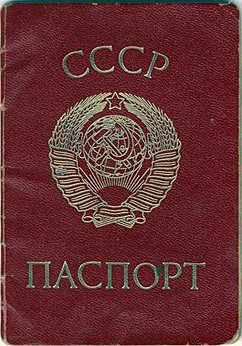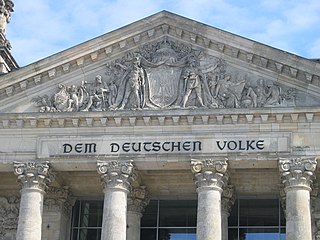Related Research Articles
Citizenship is the membership of a natural person to a polity. This status makes a person a citizen of that polity with civil and political rights, as well as duties, which are not afforded to non-citizens.
Nationality is the status of belonging to a particular nation, defined as a group of people organized in one country, under one legal jurisdiction, or as a group of people who are united by a common culture, history, traditions, and awareness of a common origin.
Reich is a German noun whose meaning is analogous to the English word "realm"; this is not to be confused with the German adjective "reich" which means "rich". The terms Kaiserreich and Königreich are respectively used in German in reference to empires and kingdoms. The Cambridge Advanced Learner's Dictionary indicates that in English usage, the term "the Reich" refers to "Germany during the period of Nazi control from 1933 to 1945".
Jus sanguinis is a principle of nationality law by which citizenship is determined or acquired by the nationality or ethnicity of one or both parents. Children at birth may be citizens of a particular state if either or both of their parents have citizenship of that state. It may also apply to national identities of ethnic, cultural, or other origins. Citizenship can also apply to children whose parents belong to a diaspora and were not themselves citizens of the state conferring citizenship. This principle contrasts with jus soli, which is solely based on the place of birth.

In Nazi German terminology, Volksdeutsche were "people whose language and culture had German origins but who did not hold German citizenship". The term is the nominalised plural of volksdeutsch, with Volksdeutsche denoting a singular female, and Volksdeutscher, a singular male. The words Volk and völkisch conveyed the meanings of "folk".

The German diaspora consists of German people and their descendants who live outside of Germany. The term is used in particular to refer to the aspects of migration of German speakers from Central Europe to different countries around the world. This definition describes the "German" term as a sociolinguistic group as opposed to the national one since the emigrant groups came from different regions with diverse cultural practices and different varieties of German. For instance, the Alsatians and Hessians were often simply called "Germans" once they set foot in their new homelands.
Germans are the natives or inhabitants of Germany, and sometimes more broadly any people who are of German descent or native speakers of the German language. The constitution of Germany defines a German as a German citizen. During the 19th and much of the 20th century, discussions on German identity were dominated by concepts of a common language, culture, descent, and history. Today, the German language is widely seen as the primary, though not exclusive, criterion of German identity. Estimates on the total number of Germans in the world range from 100 to 150 million, and most of them live in Germany.

Austrians are the citizens and nationals of Austria. The English term Austrians was applied to the population of Habsburg Austria from the 17th or 18th century. Subsequently, during the 19th century, it referred to the citizens of the Empire of Austria (1804–1867), and from 1867 until 1918 to the citizens of Cisleithania. In the closest sense, the term Austria originally referred to the historical March of Austria, corresponding roughly to the Vienna Basin in what is today Lower Austria.

German Reich was the constitutional name for the German nation-state that existed from 18 January 1871 to 5 June 1945. The Reich became understood as deriving its authority and sovereignty entirely from a continuing unitary German Volk, with that authority and sovereignty being exercised at any one time over a unitary German "state territory" with variable boundaries and extent. Although commonly translated as "German Empire", the word Reich here better translates as "realm" or territorial "reach", in that the term does not in itself have monarchical connotations.

The German Expellees or Heimatvertriebene are 12-16 million German citizens and ethnic Germans who fled or were expelled after World War II from parts of Germany annexed by Poland and the Soviet Union and from other countries, who found refuge in both West and East Germany, and Austria.

German nationalism is an ideological notion that promotes the unity of Germans and of the Germanosphere into one unified nation-state. German nationalism also emphasizes and takes pride in the patriotism and national identity of Germans as one nation and one people. The earliest origins of German nationalism began with the birth of romantic nationalism during the Napoleonic Wars when Pan-Germanism started to rise. Advocacy of a German nation-state began to become an important political force in response to the invasion of German territories by France under Napoleon.

The Soviet passport was an identity document issued pursuant to the laws of the Union of Soviet Socialist Republics (USSR) for citizens of the USSR. For the general purposes of identity certification, Soviet passports contained such data as name, date of birth, gender, place of birth, ethnicity, and citizenship, as well as a photo of the passport holder. At different stages of development of the Soviet passport system, they could also contain information on place of work, social status, and other supporting information needed for those agencies and organizations to which the Soviet citizens used to appeal.

German nationality law details the conditions by which an individual is a national of Germany. The primary law governing these requirements is the Nationality Act, which came into force on 1 January 1914. Germany is a member state of the European Union (EU) and all German nationals are EU citizens. They have automatic and permanent permission to live and work in any EU or European Free Trade Association (EFTA) country and may vote in elections to the European Parliament.

French nationality law is historically based on the principles of jus soli and jus sanguinis, according to Ernest Renan's definition, in opposition to the German definition of nationality, jus sanguinis, formalised by Johann Gottlieb Fichte.
The 2002 Russian census was the first census of the Russian Federation since the dissolution of the Soviet Union, carried out on October 9 through October 16, 2002. It was carried out by the Russian Federal Service of State Statistics (Rosstat).

There are many widely varying names of Germany in different languages, more so than for any other European nation. For example, in the German language, the country is known as Deutschland from the Old High German diutisc, in French as Allemagne from the name of the Alamanni tribe, in Italian as Germania from the Latin Germania , in Polish as Niemcy from the Proto-Slavic nemets, and in Finnish as Saksa from the name of the Saxon tribe. Each of these names has further been adapted into other languages all over the world.

Estonian citizenship law details the conditions by which a person is a citizen of Estonia. The primary law currently governing these requirements is the Citizenship Act, which came into force on 1 April 1995.
Ideas and practices of nationality and citizenship in the Republic of Argentina have changed with distinct periods of its history, including but not limited to periods of indigenous, colonial, republican, and military rule.
Volkstum is the entire utterances of a Volk or of an ethnic minority over its lifetime, expressing a "Volkscharakter" which the people of such an ethnicity allegedly have in common. It was the defining idea of the Völkisch movement.

The German noun Volk translates to people, both uncountable in the sense of people as in a crowd, and countable in the sense of a people as in an ethnic group or nation.
References
- ↑ Mezger, Caroline (2020-02-27). Forging Germans: Youth, Nation, and the National Socialist Mobilization of Ethnic Germans in Yugoslavia, 1918-1944. Oxford University Press. p. 187. ISBN 978-0-19-259047-3.
- ↑ Liebscher, G.; Dailey-O'Cain, J. (2013-11-08). Language, Space and Identity in Migration. Springer. pp. 235–236. ISBN 978-1-137-31643-1.